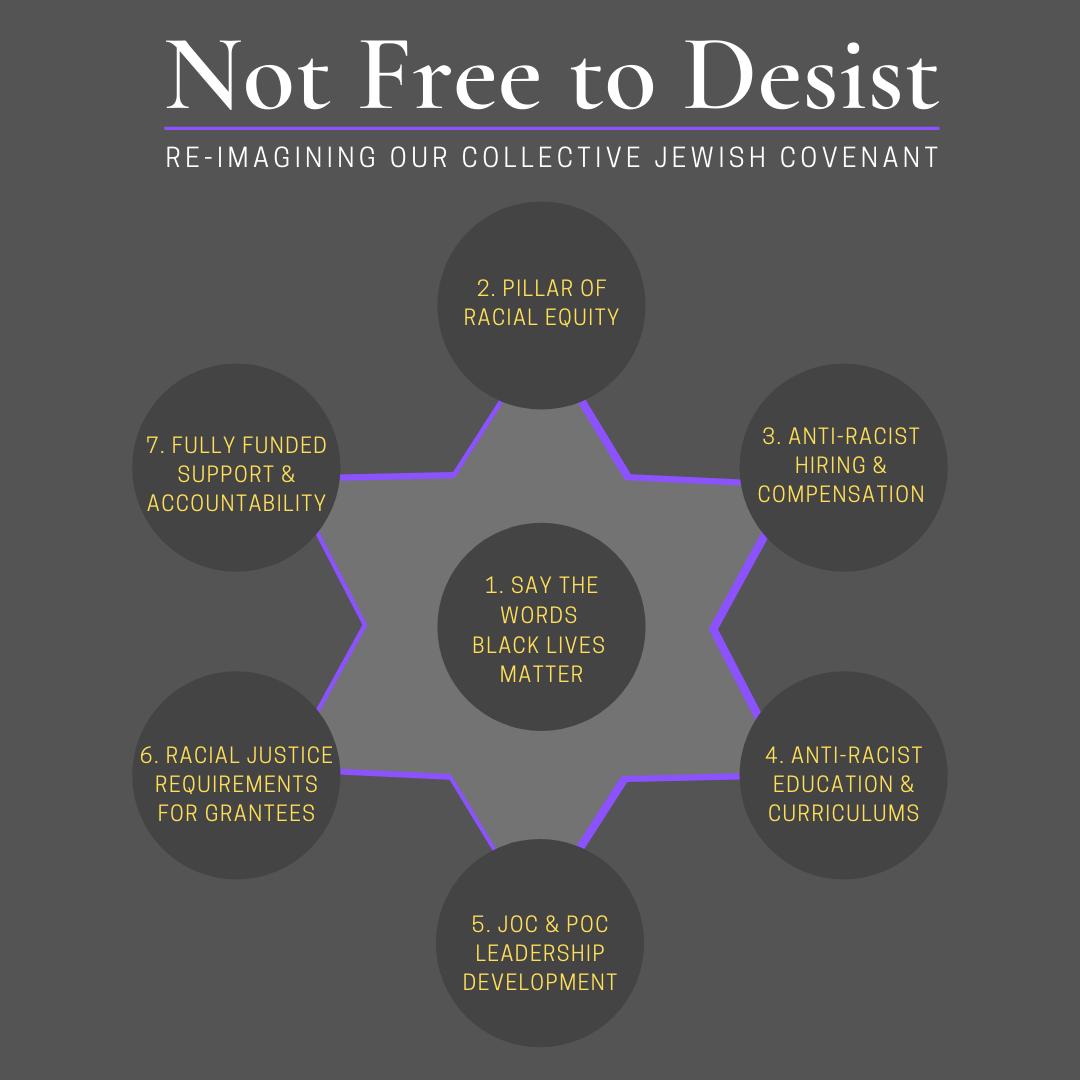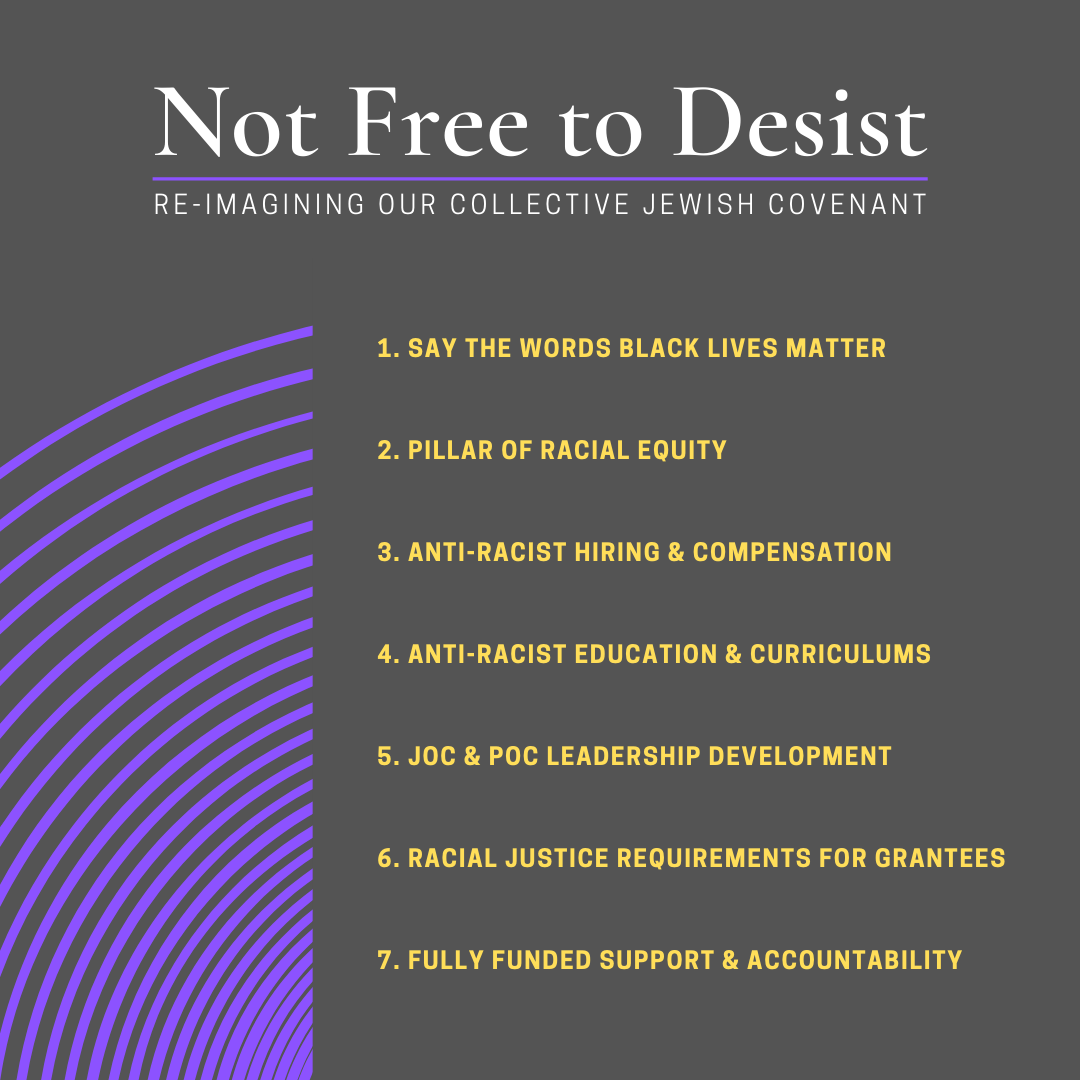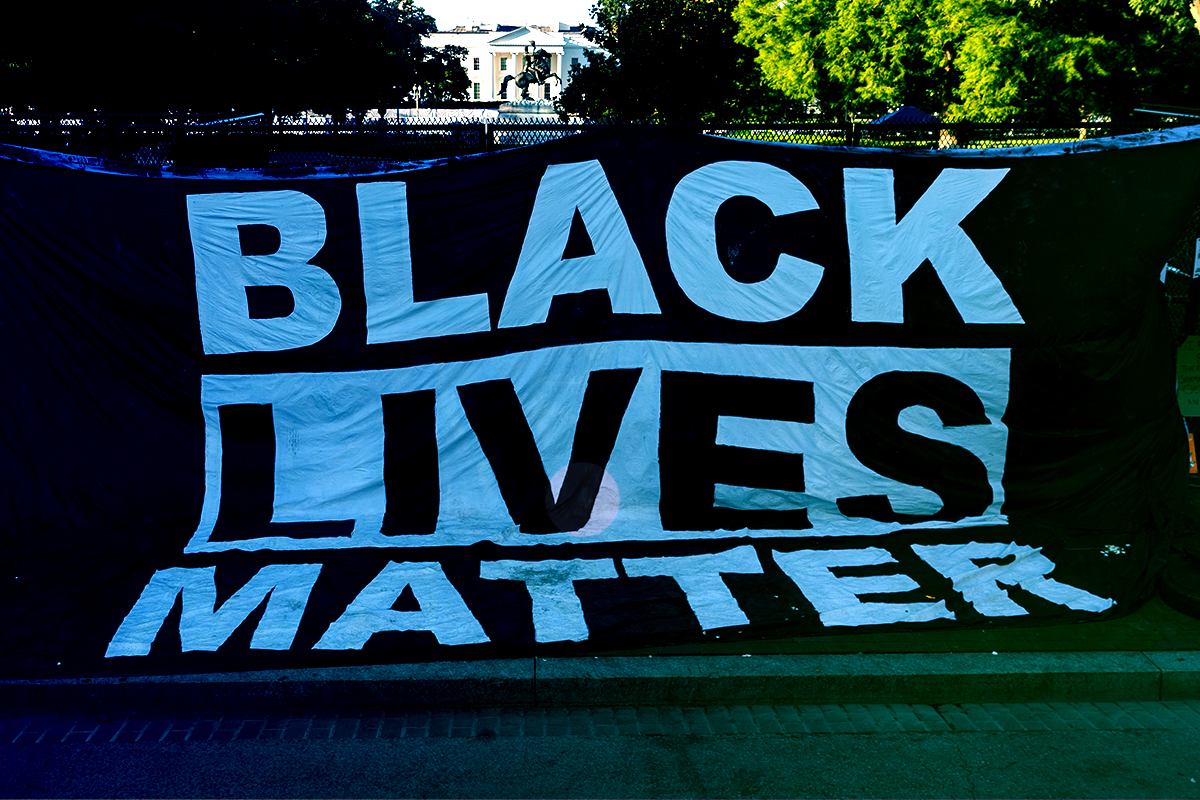The following letter is from the new platform “Not Free to Desist” and is addressed to all Jewish federations, foundations, organizations, and initiatives.
We write to you today as dedicated members of the American Jewish community, who are called by the Jewish imperative to not sit idly by when we see injustice before us.
We are Jewish communal professionals, lay leaders, board members, and we engage at every level of Jewish institutional life. We are Black Jews of Color, Non-Black Jews of Color, and allies to the Jew of Color (JOC) community. As such, while shouldering the ever present burden of antisemitism, we are Jews who have also had to bear the brunt of racism that exists both outside of and within our own community. Yet, we are still moved by our love for the Jewish community because we have experienced first hand the richness that this community offers.
We are in unprecedented times wherein a national spotlight has been focused on the deep institutional racism in our country. Anti-Black racism has been the bedrock of the structures of this country since its founding, yet it is only with the tragic murders of George Floyd, Breonna Taylor, Tony McDade, Ahmaud Arbery and countless other Black people, that many in this country have turned their attention to the issue. In the past few weeks, we have seen protests in all 50 states and our nation’s capital, followed by policy changes across government, corporations, and the nonprofit world.
We acknowledge that this is not the first time that Jewish communities have been called in to address concerns regarding racism, inequity, and inclusivity. We give thanks to the organizations and individuals who have been carrying this mantle for decades. Furthermore, we give love to the many incredible individual Black Jews of Color, Non-Black Jews of Color, and allies who have been deeply committed to addressing racial justice in the Jewish community. While we honor and acknowledge the significant investments towards racial justice from many Jewish institutions, we are calling in the Jewish institutional community to challenge ourselves to dream big.
Judaism is predicated on a covenant which outlines the holy obligations we hold to one another as members of a community with a collective purpose. Our covenants remind us that those with power have an obligation to empower those with less and remind us that those with freedom have an obligation to help free those who are without. When we honor our commitment to each other then our communities will flourish with rain at its proper time, grain, wine, oil, and grass in our fields. When we do not fully commit, we risk the future of our very community.
So we call in our community to re-imagine our sacred covenant to one another and to our collective future. And we call for this re-imagination to include the following seven obligations to be upheld by all Jewish funders and organizations. We recognize that this work will take time, and recommend the following timeline: all Jewish organizations should make a commitment to fulfill at least 4 out of the 7 obligations within one year (by June 19, 2021) and to fulfill 7 out of the 7 obligations within 3 years (by June 19, 2023).

The proposed obligations are as follows:
1) Explicit endorsement that Black Lives Matter. Recognizing that Black Lives Matter is a statement that is inherently true and should be accepted without caveat or qualification.
2) Establish racial justice and social equity as an explicit pillar of your organization. This should include but not be limited to: a) investment in education, spiritual nourishment, and community repair for the effects of racism within the Jewish community; b) investment in solidarity and support initiatives between JOC and non-Jewish POC communities; c) the creation of a fund to explicitly support anti-black racism initiatives and policy change in the communities you operate in; d) creation of an ongoing protocol for naming and addressing instances of racism when it happens and engaging in restorative justice.
3) Commit to explicit intersectional anti-racist and inclusive hiring and compensation practices. This should include but not be limited to: a) 20% of all Board Seats be occupied by people of color of which a significant portion should be JOC; b) 20% of all employees be people of color; c) 20% of all senior leadership be people of color of which a significant portion should include JOC; d) a dedicated fund to hire an external POC-led recruiting firm to source employees and board positions; e) internal support structure to ensure retention, training, and support explicitly for employees of color; f) mandated quarterly in-person and/or digital unconscious bias and anti-black racism training for all employees to be led by Black, JOC or POC consultants or consulting organizations; g) periodic review of compensation levels for all staff across various dimensions of diversity; h) 30% of compensation for senior leadership be contractually tied to the achievement of anti-racist hiring, staffing, and compensation goals, i) a mechanism to track these metrics and publicly post the results for community accountability.
4) Commit to anti-racist educational initiatives, curriculums and frameworks. This should include but not be limited to: a) appreciation for the inherent multiracial identity of the Jewish community; b) inclusion of the history of JOC communities around the world, and historical figures that identified as Black and Jewish; c) an anti-racist framework and lens for organizational decision making; d) public statement acknowledging the erasure of Jews of color and their traditions from textbooks, trainings, and Jewish education, and a commitment to actively and aggressively correct this erasure.
5) Invest in JOC and POC leadership development. This should include but not be limited to: a) a commitment for Jewish institutional funding to allocate 20% of all granted dollars to JOC and POC led organizations & initiatives; b) develop a strategic initiative within the Jewish Federated system with JOC leadership to fund JOC led organizations, initiatives, and individuals; c) JOC and POC involvement in the design, implementation and review process of all initiatives that impact JOCs and POCs; d) JOC and POC involvement in all strategic decision making processes that impact the broader community; e) commitment to pay JOC and POC whenever they are asked for advice, consultation, or engagement with organizational initiatives; f) fully funded opportunities for JOC to engage with Jewish life at no cost, including Day School, Synagogue membership, fellowships, camps, conventions, and rabbinical schools.
6) Create a robust list of racial justice, equity, and inclusion requirements that all grantees receiving Jewish institutional funding must adhere to. This should include but not be limited to: a) a commitment to replacing contracts with police departments with alternative structures of community safety that prioritize inclusive anti-racist security practices; b) mandated quarterly in-person and/or digital unconscious bias and anti-black racism training for all employees to be led by Black, JOC or POC consultants or consulting organizations; c) anti-racist and inclusive hiring and compensation practices; d) public metrics to track ongoing anti-racism work.
7) Engage in the development of a fully funded initiative to assist in our communal accountability. This should include but not be limited to: a) at least a $1.5M annual operating budget guaranteed for at least 5 years; b) a leadership team composed of majority Black Jews and JOCs; c) a focus and investment in coalition building among JOC led organizations and ventures d) active support of this initiative to empower it to consult, support, and provide metrics for accountability to Jewish funders and organizations as they implement the above obligations; e) the creation of said organization should be advised by a JOC led and majority JOC task force.

Rabbi Tarfon teaches, it is not incumbent upon you to complete the work, nor are you free to desist from it. We believe the fulfillment of these obligations anchor the essential foundation of a loving, liberated, and anti-racist Jewish community. This work will be hard, and these obligations are by no means exhaustive. We recognize the challenges to fulfillment will be many and will be determined by the particular communal landscape wherein the work is to be done. We call on all organizations taking on this work to interpret these metrics relative to the localities in which the work is being done.
This work will require critical conversations, internal reflection, and an ongoing commitment to be imaginative in our love for one another, especially as many of our organizational priorities have shifted in the wake of COVID-19. This change is also urgent and requires accountability in order to be achieved.
As such, we recommend all Jewish organizations to make a commitment to fulfill at least 4 out of the 7 obligations within one year (by June 19, 2021) and to fulfill 7 out of the 7 obligations within 3 years (by June 19, 2023).
We invite all Jewish organizations into partnership with us to engage in reimagining this covenant. To continue the conversation, we encourage a timely public statement expressing your commitment to combating anti-Black racism in the Jewish community by June 19th, 2020, in recognition of Juneteenth.
We invite all individuals and organizations who believe that this is a worthwhile conversation to join us in action and add your name as a signatory to this letter. Na’aseh v’nishma–we will do, and we will continue to listen and understand.
Signed in solidarity,
Lindsey Newman
Aaron Samuels
Rachel Sumekh
To learn more, please visit Not Free to Desist.
Header image by Aurora Samperio/NurPhoto via Getty Images.



